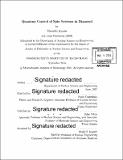Quantum control of spin systems in diamond
Author(s)
Hirose, Masashi, Ph. D. Massachusetts Institute of Technology
DownloadFull printable version (10.80Mb)
Other Contributors
Massachusetts Institute of Technology. Department of Nuclear Science and Engineering.
Advisor
Paola Cappellaro.
Terms of use
Metadata
Show full item recordAbstract
The precise control of a system which behaves according to the principles of quantum mechanics is an essential task in order to fully harness the unique properties of quantum mechanics, such as superposition and entanglement, for practical applications. Leveraging the quantum nature of the system would enable, for example, the implementation of quantum computation and quantum metrology. However, any realistic quantum system is inevitably coupled to its environment. The interaction with its surroundings irrevocably destroys the quantum nature of the system: mitigating decoherence is thus one of the central problems in quantum control. In this thesis, we develop novel control methods to protect a qubit from decoherence by two distinct approaches, and demonstrate them experimentally using the nitrogen-vacancy (NV) center in diamond. The first approach rests on an open-loop control scheme and is tailored to improve quantum sensing tasks. We develop a continuous dynamical decoupling (CoDD) method that allows us to tune the degree of protection from a dephasing environment. Exploiting this flexibility, we show that the CoDD can be used to measure magnetic fields with sensitivity comparable to existing methods, while providing superior versatility in practical experimental settings. This protocol can adapt to various sensing conditions that might occur in biological and materials science such as measurement time and sensitive frequency. The second approach exploits a coherent feedback protocol. We take advantage of a long-lived nuclear spin as an ancillary spin to protect the qubit of interest from decoherence. We show that the protocol protects the qubit as long as open-loop dynamical decoupling control schemes and it can be used against more general types of noise than the open-loop protocol. This method thus offers an alternative protocol to protect the qubit from decoherence in quantum computation and quantum metrology.
Description
Thesis: Ph. D., Massachusetts Institute of Technology, Department of Nuclear Science and Engineering, 2015. Cataloged from PDF version of thesis. Includes bibliographical references (pages 101-113).
Date issued
2015Department
Massachusetts Institute of Technology. Department of Nuclear Science and EngineeringPublisher
Massachusetts Institute of Technology
Keywords
Nuclear Science and Engineering.